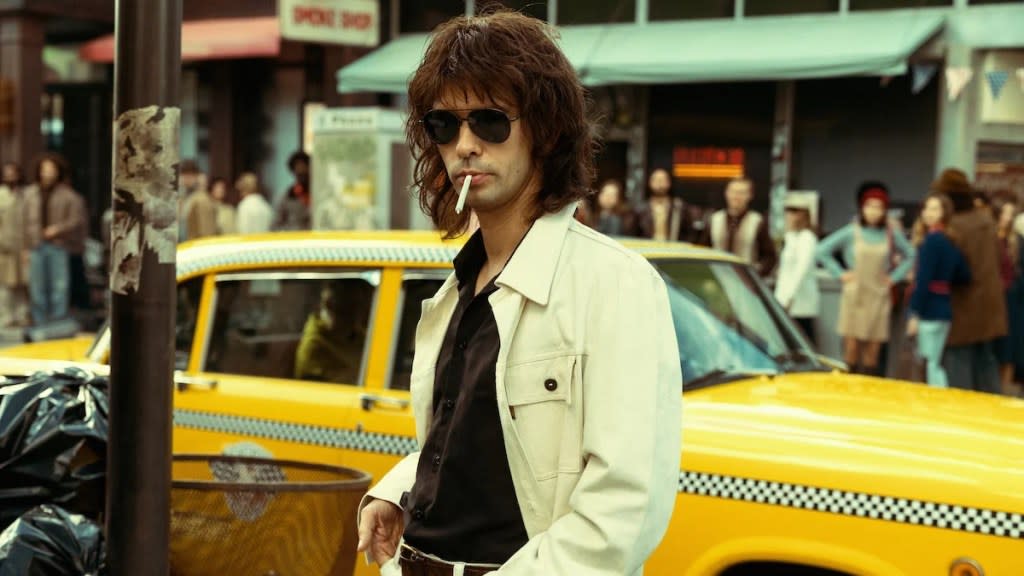‘Limonov: The Ballad’ Review: Ben Whishaw Shines in a Jukebox Musical of Urban Squalor

- Oops!Something went wrong.Please try again later.
- Oops!Something went wrong.Please try again later.
If the sprawling contradictions of any single life will invariably exceed the narrow narrative constraints of a feature-length biopic, the particular mess and mania unique to Russian poet-turned-rabble-rouser-turned-Nazbol party leader Eduard Limonov would be enough to send even the most seasoned filmmaker screaming.
Which is more or less what happened to “Cold War” director Paweł Pawlikowski, who spent years trying to find coherence for such an unruly tale before ultimately giving up and handing off the project to Kirill Serebrennikov. That Russian film and theater director did stay the course all the way through, even when that course required six months of shutdowns following Russia’s 2022 invasion of Ukraine.
Though the real Limonov spent the last years of his life cheerleading for such an invasion, you won’t hear many echoes of that (ever-ongoing) conflict but for a closing-credits cap in Serebrennikov’s “Limonov: The Ballad,” which premiered in the Main Competition at the Cannes Film Festival.
Indeed, as that added subtitle would suggest, Serebrennikov’s take is closer in tune to his 2017 musical biopic “Leto,” offering another stage for the filmmaker’s brand of big-screen showmanship that skirts the challenges of a narrative biography by resetting its terms on more comfortable stylistic grounds.
That’s not exactly bad news, as Serebrennikov’s style is accomplished and distinctive enough to warrant a spotlight in Cannes for each of his past five films. The Russian auteur has developed a poetic language all of his own, orchestrating unbroken traveling shots that dip in and out of fantasy and while collapsing both narrative and expository elements into an organic and interactive visual space.
Serebrennikov doesn’t simply note the passage of time with an onscreen supertitle; instead he builds that information onto his sets before embellishing those frames with annotations and asides, and introducing background dancers swaying to the music we initially thought only the audience could hear.
That might explain Serebrennikov’s dedication to this project, because in the punk poet Eduard Limonov, the maximalist filmmaker has found his ideal Byronic rogue. Played with sinewy energy by Ben Whishaw, the character that goes by “Eddie” moves through the world with a chip on his shoulder and a fire in his guts. Eddie, you see, was born under a different family name, rebranding himself Limonov to evoke the Russian word for grenade, taking on a nom-de-plume that doubles as a nom-de-guerre as he cuts a fearsome path through the literary salons of the USSR.
Mind you, Eddie’s rakish persona most fully emerges once the aspiring poet and his aspiring model wife Yelena (Viktoria Miroshnichenko, “Beanpole”) find themselves willingly and eagerly exiled to the Big Apple at the city’s grimiest low. If our two starving artists seize on John Lindsay’s New York with wanton pleasure, taking in every squalid pleasure the city has to offer, they just as readily seek out adversity. The film frames the artist as gutter punk, sponging up dirt and grime and grease and gruel to channel it back into his work. The problem is, no one cares to actually read that work, which only fuels Eddie’s anti-social malaise.
The director takes equal delight in his New York City playground, devoting more than half the film to that American stopover, most of it scored to the music of Lou Reed. The film sometimes plays like a jukebox musical of urban squalor, revealing more of the filmmaker’s passions than those of the title character. Eventually Eddie loses his marriage but gains full-time employment, moving on up to the Upper East Side to serve as live-in butler for a lush millionaire. That new station taps him into a network of dissident Russian authors – he hates them, of course.
That hatred only grows by the time Eddie finds literary success of his own in Paris a decade later, and it reaches a white hot peak by the time he gets back home just in time to watch the Berlin Wall fall from the Eastern side. If, as described, these pieces feel like self-evident building blocks leading towards a skinhead-adjacent ideology, the film itself resists such psychological profiling. Instead, “Limonov: The Ballad” leans into the more visceral extremes of Eddie’s experience, playing into Serebrennikov’s strengths as a screen stylist above all else.
That makes for a galvanizing bout of agitprop somehow devoid of politics, a portrait of an artist-turned-agitator that elides the man’s intellectual life and output.
For good or ill, “Limonov: The Ballad” reflects the limitations of this kind of biopic form, owning up to its inability to account or explain its central paradox by doodling around the margins. This ballad finds a groove and rides it out, showcasing the director’s chops and the star’s commitment while shining little new light on the ostensible subject. In that sense, “Limonov: The Ballad” most ably lives up to one half of its title.
The post ‘Limonov: The Ballad’ Review: Ben Whishaw Shines in a Jukebox Musical of Urban Squalor appeared first on TheWrap.

